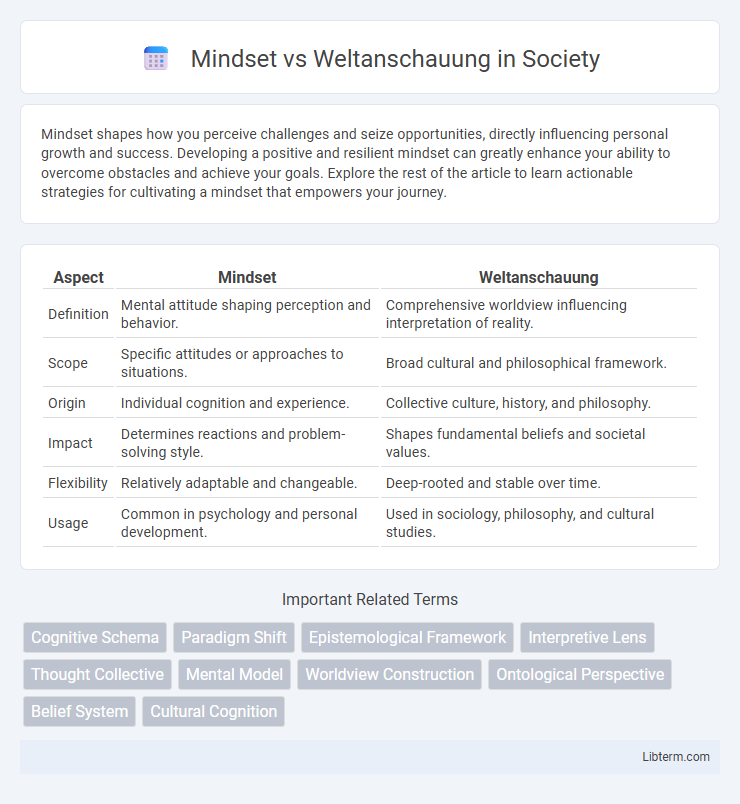Mindset shapes how you perceive challenges and seize opportunities, directly influencing personal growth and success. Developing a positive and resilient mindset can greatly enhance your ability to overcome obstacles and achieve your goals. Explore the rest of the article to learn actionable strategies for cultivating a mindset that empowers your journey.
Table of Comparison
| Aspect | Mindset | Weltanschauung |
|---|---|---|
| Definition | Mental attitude shaping perception and behavior. | Comprehensive worldview influencing interpretation of reality. |
| Scope | Specific attitudes or approaches to situations. | Broad cultural and philosophical framework. |
| Origin | Individual cognition and experience. | Collective culture, history, and philosophy. |
| Impact | Determines reactions and problem-solving style. | Shapes fundamental beliefs and societal values. |
| Flexibility | Relatively adaptable and changeable. | Deep-rooted and stable over time. |
| Usage | Common in psychology and personal development. | Used in sociology, philosophy, and cultural studies. |
Understanding Mindset: Definition and Origins
Mindset refers to the established set of attitudes or beliefs shaping an individual's thought processes and behavior, fundamentally influenced by cognitive and psychological development. It originates from personal experiences, social environments, and cultural context, molding how challenges and opportunities are perceived and approached. Understanding mindset involves recognizing its dynamic nature and potential for transformation through conscious effort and learning.
Exploring Weltanschauung: Meaning and Historical Roots
Weltanschauung, a German term meaning "worldview," encompasses the comprehensive set of beliefs and perspectives shaping an individual's or culture's interpretation of reality. Rooted in philosophy and anthropology, its historical origins trace back to German idealism in the 19th century, where thinkers like Wilhelm Dilthey emphasized the connection between worldview and lived experience. This concept extends beyond mindset by integrating cultural, historical, and existential dimensions, influencing how societies construct meaning and identity.
Core Differences: Mindset vs Weltanschauung
Mindset refers to an individual's established set of attitudes and beliefs influencing behavior and decision-making, often shaped by personal experiences and cognitive patterns. Weltanschauung, a comprehensive worldview, encompasses broader cultural, philosophical, and existential perspectives that frame how individuals interpret and relate to society and existence. The core difference lies in mindset being a localized psychological framework, while Weltanschauung represents an all-encompassing, systemic worldview shaping identity and perception at a macro level.
How Mindset Shapes Individual Behavior
Mindset, defined as the cognitive framework influencing perception and decision-making, directly shapes individual behavior by determining responses to challenges, opportunities, and social interactions. It operates at a personal level, affecting motivation, resilience, and goal orientation, whereas Weltanschauung refers to a broader cultural or philosophical worldview encompassing values and beliefs shared by communities. Understanding the distinction clarifies how mindset cultivates specific habits and attitudes that drive personal growth, while Weltanschauung frames collective identity and societal norms.
The Role of Weltanschauung in Shaping Societies
Weltanschauung, as a comprehensive worldview encompassing cultural, philosophical, and ideological perspectives, profoundly shapes societal norms, values, and collective behavior patterns. Unlike mindset, which refers to individual cognitive frameworks, Weltanschauung influences social institutions, governance structures, and cultural identities on a broad scale. This interconnectedness explains how shared Weltanschauung fosters social cohesion, drives historical movements, and impacts policy-making across civilizations.
Interplay Between Mindset and Weltanschauung
Mindset shapes an individual's cognitive approach and problem-solving strategies, while Weltanschauung represents a broader worldview encompassing cultural, philosophical, and existential beliefs. The interplay between mindset and Weltanschauung influences decision-making processes, behaviors, and perception of reality by integrating personal attitudes with overarching worldviews. Understanding this dynamic helps in analyzing how internal cognitive patterns align or conflict with external ideological frameworks, impacting psychological resilience and social interactions.
Influences on Mindset: Culture, Upbringing, and Experience
Culture shapes mindset by embedding shared values, norms, and belief systems that guide individual perceptions and decision-making processes. Upbringing contributes foundational attitudes and cognitive frameworks through family dynamics, education, and early social interactions, which significantly influence responses to challenges. Past experiences further refine mindset by reinforcing or challenging previous assumptions, fostering adaptability or entrenched thinking patterns.
How Weltanschauung Evolves Across Generations
Weltanschauung, or worldview, evolves across generations through the accumulation and reinterpretation of cultural, historical, and social experiences, embedding collective values that shape group identity over time. Unlike mindset, which is often individual and situational, Weltanschauung reflects a shared cognitive framework influenced by language, traditions, and intergenerational narratives. This evolution affects societal norms and behaviors, continuously adapting to technological advances, political shifts, and environmental changes.
Practical Implications: Personal Growth and Worldview
Mindset, as a set of cognitive attitudes influencing personal behavior and learning, drives individual growth through adaptability and resilience. Weltanschauung, encompassing a comprehensive worldview shaped by cultural and philosophical backgrounds, frames how individuals interpret their experiences and interact with society. Understanding the distinction aids in practical applications by targeting mindset for personal development strategies while leveraging Weltanschauung to navigate broader social and ethical contexts.
Mindset and Weltanschauung: Towards Holistic Development
Mindset refers to an individual's established set of attitudes and beliefs that shape behavior and decision-making, while Weltanschauung encompasses a comprehensive worldview that integrates cultural, philosophical, and existential perspectives. Understanding the dynamic interaction between mindset and Weltanschauung is crucial for holistic development, as it allows for the alignment of personal cognitive frameworks with broader socio-cultural values. Cultivating an adaptive mindset within a well-rounded Weltanschauung fosters resilience, empathy, and effective problem-solving across diverse life challenges.
Mindset Infographic

 libterm.com
libterm.com